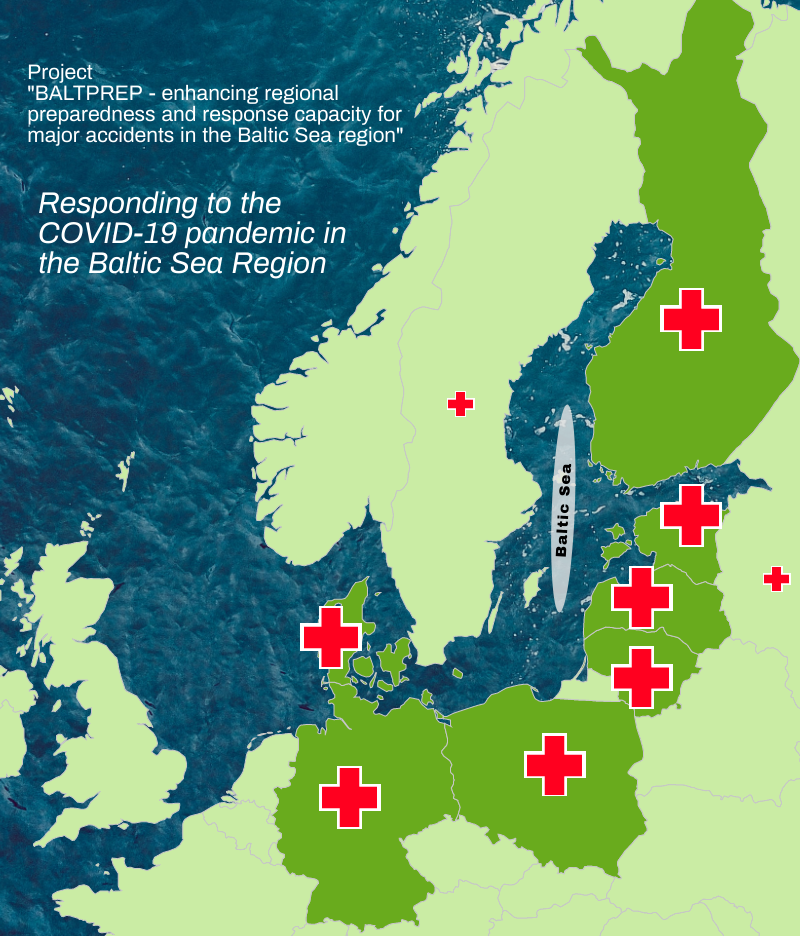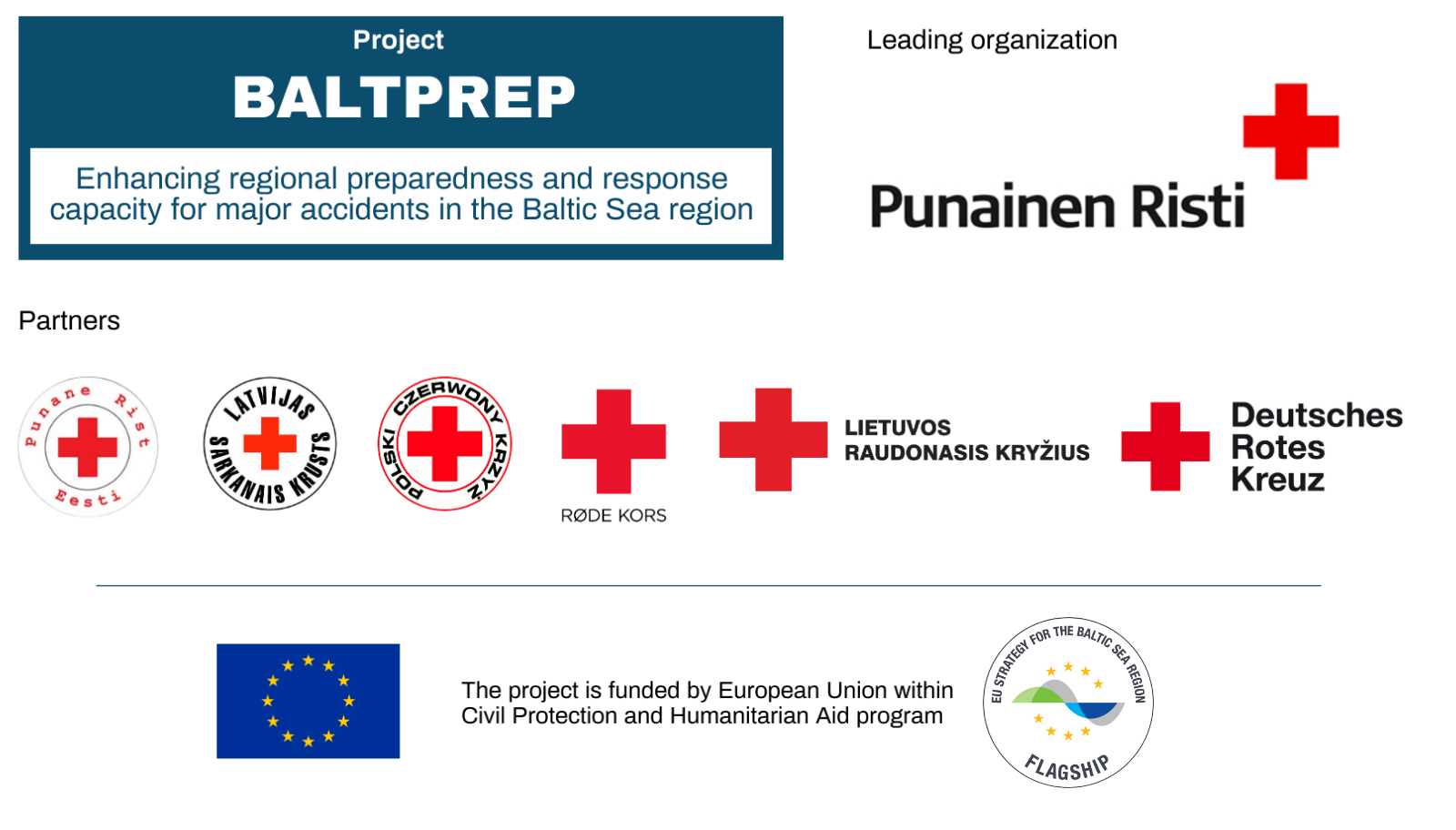

The rapidly spreading COVID-19 pandemic is unprecedented in recent history. It is not only a public health crisis but also a humanitarian crisis that will impact the lives, health and livelihoods of people around the world. In the Baltic Sea region, Red Cross National Societies support national authorities in preparing and responding to the pandemic.
National Societies are sharing experiences
Preparing and responding to the COVID-19 pandemic is a challenging long-term operation to the Red Cross National Societies in the Baltic Sea region. It has special characteristics such as the implementation of Emergency Powers Law and restrictions which also affect the work of the Red Cross.
In the Baltic Sea Region, the Red Cross Societies have an important role in offering psychosocial support and helping the most vulnerable people during this crisis. They also must deal with the important issue of safety of their volunteers. The participating National Societies to the BALTPREP project have been sharing their experiences and insights into the COVID-19 actions. The aim of the project is to enhance region-wide cooperation and capacity in responding to major disasters in the Baltic Sea region. Depending on the country and the situation of the pandemic, National Societies have been engaging in various activities and operations.
In Germany, there has been a steep rise in the number of infections. So far the German Red Cross headquarters has mainly been involved in three operations, commissioned by the federal authorities in the country. The Red Cross volunteers and staff have for example hosted returnees quarantined for 14 days. Catering, leisure activities and psychosocial support were organized for people and their access to medical services was ensured or provided by the Red Cross. Further, German Red Cross branches are helping to organize various activities, such as emergency day care for children, fever check-ups, supporting the testing of people for Covid-19, running or supporting quarantine accommodations and assistance for people in home quarantine.
In Latvia, a state of emergency was declared at the beginning of March. In co-operation with the International Federation of Red Cross and Red Crescent Societies (IFRC) and the World Health Organization, and in response to the recommendations of the Latvian authorities, Latvian Red Cross is providing information about the prevention of getting infected with the virus and what to do if a person has been infected etc. We are also offering support of volunteers who would buy food for people who are in quarantine or isolated, however there are not many requests for it. Latvian Red Cross is providing all the classical services (e.g., home service, all shelter and social centres are running) as those services cannot be done remotely or digitally.
The Latvian Red Cross is actively communicating on prevention, carrying out health promotion activities and supporting people in quarantine.
Estonia is also in state of emergency and the Estonian Red Cross has been working as an auxiliary to the authorities by screening thermal cameras, distributing information materials and providing health counseling, if needed, at Tallinn port passenger terminals and Tallinn Airport during two weeks. The Estonian Red Cross is also supporting local authorities in needs-based support such as food delivery to the elderly living alone, distribution of information materials and other community support aimed at the most vulnerable at branch level. A state of emergency has been declared also in Poland, where the actions of the Polish Red Cross concentrate on the promotion of blood donations by branches on the Internet and social media and continuing the implementation of a food aid programme. The Polish Red Cross provides home care services, and psychosocial support. A psychosocial support helpline is also in place. Webinars are organized especially to engage young volunteers and make them stay at home.
Many restrictions are taking place in Denmark, too. The Danish Red Cross is supporting authorities and carrying out Red Cross stand-alone operations. The auxiliary role includes participating in a call center, where various authorities have come together to activate a hotline for questions around the situation. Volunteers and interested people have been mobilized for this operation. At the call centre, the needs are currently shifting from providing symptoms related information to offering psychological support to those especially worried about the situation. The Danish Red Cross has also established a social online network for people hit by COVID-19, many of whom are already in a vulnerable position. Further, Danish Red Cross volunteers support people in running errands and help to match those who need help with those who want to help. The Danish Red Cross also distributes support packages to prisoners and homeless people and ensures health care and safe/protected quarantine possibilities to undocumented migrants.
In Finland, the state of emergency continues, and the Finnish Red Cross is supporting the most vulnerable groups as requested by the authorities. On request, the Red Cross provides hospitals with Triage units to enhance the capacity to assess people’s need for treatment. Volunteers support elderly and other vulnerable people. Support is offered online and by phone, as volunteers trained in psychosocial support help those troubled by the situation. The Finnish Red Cross Youth Shelters run a chat service for youth in cooperation with two associations. Communication, publishing information on the COVID-19 and sharing messages of the authorities, also play an essential role.
BALTPREP project has strengthened the capacity of the Red Crosses in the Baltic Sea region
The joint project of the Red Cross National Societies of the Baltic Sea Region, BALTPREP, strengthens regional preparedness and response capacity in the Baltic Sea Region. The project has also strengthened the capacity of the National Societies in providing psychosocial support and in management of spontaneous volunteers. This knowledge and learning have proved to be especially useful for the COVID response as the countries have seen a rise in people wanting to help and spontaneously volunteer for the Red Cross. During this extraordinary and difficult time, psychosocial support is also needed widely.
The project has strengthened the cooperation and collaboration between the National Societies and with civil protection authorities in the region, and in this way has facilitated sharing of learning, which is having a positive effect on the response in the different countries.
BALTPREP is funded by the EU and is a flagship project of the EU Strategy for the Baltic Sea Region.

